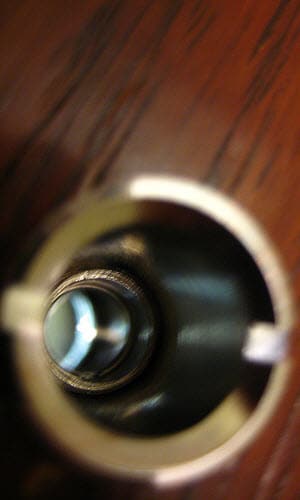There has been considerable press coverage of ESPN Sportscaster Erin Andrews’ invasion of privacy by a stalker with a cell phone camera and a modified hotel peephole – the hotel industry must respond.

Despite the media frenzy, there is a very good reason for hotel rooms to have peepholes
Image Credit: somenametoforget – cc|flickr
This problem is not actually a new issue – In the early 1980’s, I worked in a hotel where there was a similar incident. The investigation revealed that the perpetrator had actually modified dozens of peepholes across three different properties. The fundamental difference was that no celebrities or video cameras were involved. In today’s age of social media, hoteliers must realize that any incidents involving the violation of a guest’s personal privacy now run the risk of spreading rapidly through both social and traditional media.
One particularly negative outcome of the Erin Andrews incident is that some ridiculously bad recommendations are being made for women traveling alone. Women SHOULD NOT smear Vaseline on the inside of a peephole to make it opaque. While this may make it impossible for someone on the outside to use a modified peephole, it will also make the peephole unusable from the inside as well. Women staying in hotels alone should always use the peephole before opening the door, even when expecting visitors or room service. Being filmed through a modified peephole is a terrible thing, but not nearly as bad as opening a door and providing an opportunity for an unwanted visitor to enter the room.
It is important to remember that hotel guest rooms with unaltered peepholes are secure from external viewing. So here are the steps the hotel industry can take to eliminate this issue.
Peephole security, like most hotel security issues, is reliant on quality staff training. Technology can assist, but most problems are ultimately linked to a human failure. In the vast majority of altered peephole cases, the perpetrator requires some form of assistance from a hotel employee.
There are three possible scenarios as I see it:
- Room number of traveler is directly or indirectly revealed to the perpetrator by an employee. (Perpetrator targets a single individual.)
- Access to a specific room is provided by an employee to the perpetrator (Perpetrator victimizes random inhabitants of specific room.)
- Employee and perpetrator conspire to provide access to rooms of multiple individuals (Perpetrator targets category of individuals.)
Alternative number three requiring the cooperative effort of a perpetrator and an employee would occur least frequently, but would also represent the greatest potential severity risk. I would contend that it is highly unlikely for a perpetrator that is not employed by the hotel to target a single room and then methodically attempt to film guests through the peephole given that the room may be empty or occupied by an “undesirable target”, a majority of the time.
The hotel industry can take three steps that will go a long way toward resolving the peephole security issue:
- Housekeepers check peepholes as part of standard room cleaning process to ensure proper functionality.
- Regular training of all staff regarding guest personal security, including providing room numbers, guest names in specific rooms, allowing persons without keys to enter guest rooms, or requests for adjacent rooms.
- Improved guest room corridor security with adequate video coverage to enable identification of individuals loitering near guest room doors.
Guest privacy violations are low frequency/high severity incidents, so proactive training must be undertaken by the hoteliers. Hotel staff must also be tested periodically using undercover spotters to confirm proper adherence to policies. Guest convenience can never be prioritized over guest safety – especially in luxury hotels. The key for hoteliers is to implement efficient and unobtrusive processes that ensure guest security with the minimum amount of inconvenience.
Hotel managers with concerns that guests may take offense to reasonable security procedures are worrying unnecessarily. Guests are typically very understanding when advised of policies that require identification or answering basic questions before being provided with personal information or access to a guest room.
Finally, when there is widespread coverage of high profile crimes, there is always the unfortunate risk of copycat incidents. Hopefully the penalty for Erin Andrews’ accused stalker will be appropriately severe to discourage any copycat from reproducing the crime.
Despite the impact of the global financial downturn on the hospitality industry, aside from life safety spending, there are no expenditures that are more necessary than training and technology that ensure the guest’s personal security.